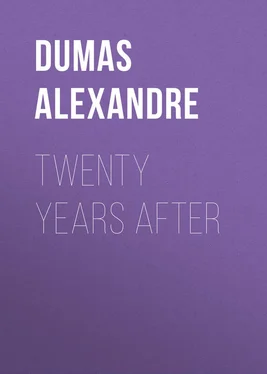Alexandre Dumas - Twenty Years After
Здесь есть возможность читать онлайн «Alexandre Dumas - Twenty Years After» — ознакомительный отрывок электронной книги совершенно бесплатно, а после прочтения отрывка купить полную версию. В некоторых случаях можно слушать аудио, скачать через торрент в формате fb2 и присутствует краткое содержание. Жанр: literature_19, foreign_antique, foreign_prose, на английском языке. Описание произведения, (предисловие) а так же отзывы посетителей доступны на портале библиотеки ЛибКат.
- Название:Twenty Years After
- Автор:
- Жанр:
- Год:неизвестен
- ISBN:нет данных
- Рейтинг книги:5 / 5. Голосов: 1
-
Избранное:Добавить в избранное
- Отзывы:
-
Ваша оценка:
- 100
- 1
- 2
- 3
- 4
- 5
Twenty Years After: краткое содержание, описание и аннотация
Предлагаем к чтению аннотацию, описание, краткое содержание или предисловие (зависит от того, что написал сам автор книги «Twenty Years After»). Если вы не нашли необходимую информацию о книге — напишите в комментариях, мы постараемся отыскать её.
Twenty Years After — читать онлайн ознакомительный отрывок
Ниже представлен текст книги, разбитый по страницам. Система сохранения места последней прочитанной страницы, позволяет с удобством читать онлайн бесплатно книгу «Twenty Years After», без необходимости каждый раз заново искать на чём Вы остановились. Поставьте закладку, и сможете в любой момент перейти на страницу, на которой закончили чтение.
Интервал:
Закладка:
There is nothing so convincing as a firm conviction. It has its own effect upon the most incredulous; and far from being incredulous, Mazarin was superstitious. He went away thoughtful and anxious and returned to his own room, where he summoned Bernouin and desired him to fetch thither in the morning the special guard he had placed over Monsieur de Beaufort and to awaken him whenever he should arrive.
The guard had, in fact, touched the cardinal in the tenderest point. During the whole five years in which the Duc de Beaufort had been in prison not a day had passed in which the cardinal had not felt a secret dread of his escape. It was not possible, as he knew well, to confine for the whole of his life the grandson of Henry IV., especially when this young prince was scarcely thirty years of age. But however and whensoever he did escape, what hatred he must cherish against him to whom he owed his long imprisonment; who had taken him, rich, brave, glorious, beloved by women, feared by men, to cut off his life’s best, happiest years; for it is not life, it is merely existence, in prison! Meantime, Mazarin redoubled his surveillance over the duke. But like the miser in the fable, he could not sleep for thinking of his treasure. Often he awoke in the night, suddenly, dreaming that he had been robbed of Monsieur de Beaufort. Then he inquired about him and had the vexation of hearing that the prisoner played, drank, sang, but that whilst playing, drinking, singing, he often stopped short to vow that Mazarin should pay dear for all the amusements he had forced him to enter into at Vincennes.
So much did this one idea haunt the cardinal even in his sleep, that when at seven in the morning Bernouin came to arouse him, his first words were: “Well, what’s the matter? Has Monsieur de Beaufort escaped from Vincennes?”
“I do not think so, my lord,” said Bernouin; “but you will hear about him, for La Ramee is here and awaits the commands of your eminence.”
“Tell him to come in,” said Mazarin, arranging his pillows, so that he might receive the visitor sitting up in bed.
The officer entered, a large fat man, with an open physiognomy. His air of perfect serenity made Mazarin uneasy.
“Approach, sir,” said the cardinal.
The officer obeyed.
“Do you know what they are saying here?”
“No, your eminence.”
“Well, they say that Monsieur de Beaufort is going to escape from Vincennes, if he has not done so already.”
The officer’s face expressed complete stupefaction. He opened at once his little eyes and his great mouth, to inhale better the joke his eminence deigned to address to him, and ended by a burst of laughter, so violent that his great limbs shook in hilarity as they would have done in an ague.
“Escape! my lord-escape! Your eminence does not then know where Monsieur de Beaufort is?”
“Yes, I do, sir; in the donjon of Vincennes.”
“Yes, sir; in a room, the walls of which are seven feet thick, with grated windows, each bar as thick as my arm.”
“Sir,” replied Mazarin, “with perseverance one may penetrate through a wall; with a watch-spring one may saw through an iron bar.”
“Then my lord does not know that there are eight guards about him, four in his chamber, four in the antechamber, and that they never leave him.”
“But he leaves his room, he plays at tennis at the Mall?”
“Sir, those amusements are allowed; but if your eminence wishes it, we will discontinue the permission.”
“No, no!” cried Mazarin, fearing that should his prisoner ever leave his prison he would be the more exasperated against him if he thus retrenched his amusement. He then asked with whom he played.
“My lord, either with the officers of the guard, with the other prisoners, or with me.”
“But does he not approach the walls while playing?”
“Your eminence doesn’t know those walls; they are sixty feet high and I doubt if Monsieur de Beaufort is sufficiently weary of life to risk his neck by jumping off.”
“Hum!” said the cardinal, beginning to feel more comfortable. “You mean to say, then, my dear Monsieur la Ramee-”
“That unless Monsieur de Beaufort can contrive to metamorphose himself into a little bird, I will continue answerable for him.”
“Take care! you assert a great deal,” said Mazarin. “Monsieur de Beaufort told the guards who took him to Vincennes that he had often thought what he should do in case he were put into prison, and that he had found out forty ways of escaping.”
“My lord, if among these forty there had been one good way he would have been out long ago.”
“Come, come; not such a fool as I fancied!” thought Mazarin.
“Besides, my lord must remember that Monsieur de Chavigny is governor of Vincennes,” continued La Ramee, “and that Monsieur de Chavigny is not friendly to Monsieur de Beaufort.”
“Yes, but Monsieur de Chavigny is sometimes absent.”
“When he is absent I am there.”
“But when you leave him, for instance?”
“Oh! when I leave him, I place in my stead a bold fellow who aspires to be his majesty’s special guard. I promise you he keeps a good watch over the prisoner. During the three weeks that he has been with me, I have only had to reproach him with one thing-being too severe with the prisoners.”
“And who is this Cerberus?”
“A certain Monsieur Grimaud, my lord.”
“And what was he before he went to Vincennes?”
“He was in the country, as I was told by the person who recommended him to me.”
“And who recommended this man to you?”
“The steward of the Duc de Grammont.”
“He is not a gossip, I hope?”
“Lord a mercy, my lord! I thought for a long time that he was dumb; he answers only by signs. It seems his former master accustomed him to that.”
“Well, dear Monsieur la Ramee,” replied the cardinal “let him prove a true and thankful keeper and we will shut our eyes upon his rural misdeeds and put on his back a uniform to make him respectable, and in the pockets of that uniform some pistoles to drink to the king’s health.”
Mazarin was large in promises, – quite unlike the virtuous Monsieur Grimaud so bepraised by La Ramee; for he said nothing and did much.
It was now nine o’clock. The cardinal, therefore, got up, perfumed himself, dressed, and went to the queen to tell her what had detained him. The queen, who was scarcely less afraid of Monsieur de Beaufort than the cardinal himself, and who was almost as superstitious as he was, made him repeat word for word all La Ramee’s praises of his deputy. Then, when the cardinal had ended:
“Alas, sir! why have we not a Grimaud near every prince?”
“Patience!” replied Mazarin, with his Italian smile; “that may happen one day; but in the meantime-”
“Well, in the meantime?”
“I shall still take precautions.”
And he wrote to D’Artagnan to hasten his return.
17. Duc de Beaufort amused his Leisure Hours in the Donjon of Vincennes
The captive who was the source of so much alarm to the cardinal and whose means of escape disturbed the repose of the whole court, was wholly unconscious of the terror he caused at the Palais Royal.
He had found himself so strictly guarded that he soon perceived the fruitlessness of any attempt at escape. His vengeance, therefore, consisted in coining curses on the head of Mazarin; he even tried to make some verses on him, but soon gave up the attempt, for Monsieur de Beaufort had not only not received from Heaven the gift of versifying, he had the greatest difficulty in expressing himself in prose.
The duke was the grandson of Henry IV. and Gabrielle d’Estrees-as good-natured, as brave, as proud, and above all, as Gascon as his ancestor, but less elaborately educated. After having been for some time after the death of Louis XIII. the favorite, the confidant, the first man, in short, at the court, he had been obliged to yield his place to Mazarin and so became the second in influence and favor; and eventually, as he was stupid enough to be vexed at this change of position, the queen had had him arrested and sent to Vincennes in charge of Guitant, who made his appearance in these pages in the beginning of this history and whom we shall see again. It is understood, of course, that when we say “the queen,” Mazarin is meant.
Читать дальшеИнтервал:
Закладка:
Похожие книги на «Twenty Years After»
Представляем Вашему вниманию похожие книги на «Twenty Years After» списком для выбора. Мы отобрали схожую по названию и смыслу литературу в надежде предоставить читателям больше вариантов отыскать новые, интересные, ещё непрочитанные произведения.
Обсуждение, отзывы о книге «Twenty Years After» и просто собственные мнения читателей. Оставьте ваши комментарии, напишите, что Вы думаете о произведении, его смысле или главных героях. Укажите что конкретно понравилось, а что нет, и почему Вы так считаете.


![О Генри - Через двадцать лет [After Twenty Years]](/books/415401/o-genri-cherez-dvadcat-let-after-twenty-years-thumb.webp)









